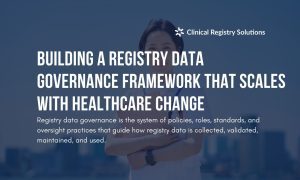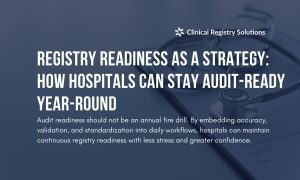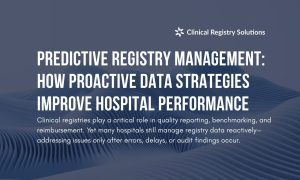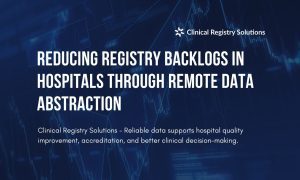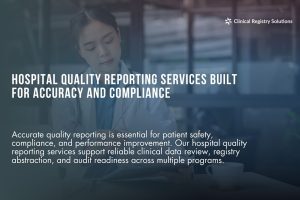- Overview: The ACC NCDR AFib Ablation Registry monitors atrial fibrillation ablation procedures to advance treatment quality and safety.
- Importance: Improves procedural success, supports accreditation, and provides data for innovation in electrophysiology.
- Key Data Elements: Patient profiles, ablation techniques, complications, and long-term efficacy.
- Challenges: Detailed documentation, follow-up tracking, and version updates—overcome with specialized services.
- Optimization Tips: Analytics integration, abstractor education, automation, and outcome analysis.
- Future Trends: AI for personalized predictions and real-time monitoring, led by solutions like Clinical Registry Solutions.
- Benefits of Partnering: Accurate submissions, reduced burdens, and elevated electrophysiology program performance.
Understanding the ACC NCDR AFib Ablation Registry
The American College of Cardiology’s (ACC) NCDR AFib Ablation Registry is essential for evaluating and refining atrial fibrillation (AFib) ablation therapies, helping electrophysiologists deliver better results.
Hospitals and abstraction experts like Clinical Registry Solutions benefit from optimized participation, leading to superior patient management in rhythm disorders.
What Is the AFib Ablation Registry?
This NCDR component gathers data on AFib ablation procedures, including techniques, outcomes, and patient follow-up nationwide.
Why Does the AFib Ablation Registry Matter?
✅ Advances AFib Treatment – Refines ablation strategies for higher success and fewer recurrences
✅ Ensures Quality & Safety – Meets standards from bodies like the Heart Rhythm Society
✅ Benchmarking Capabilities – Allows comparison of procedural metrics with peers
✅ Research Opportunities – Insights into AFib trends, device efficacy, and complication reduction
Key Data Elements in the AFib Ablation Registry
Tracked metrics encompass:
📌 Patient Characteristics – AFib type, CHA2DS2-VASc scores, and anticoagulation history
📌 Procedural Aspects – Energy sources, mapping tools, and ablation duration
📌 Outcomes & Complications – Recurrence rates, stroke risks, and phrenic nerve injuries
Such data empowers hospitals and partners like Clinical Registry Solutions to enhance electrophysiology practices.
Challenges in AFib Ablation Data Abstraction & Overcoming Them
Abstraction involves intricate details from complex procedures. Common issues:
- Comprehensive Follow-Up Data 🔹 Challenge: Tracking long-term outcomes post-ablation is resource-heavy.
- Technical Documentation Accuracy 🔹 Challenge: Varied ablation methods require precise recording. 🔹 Solution: Utilize outsourced services from Clinical Registry Solutions for expert handling.
- Registry Evolution 🔹 Challenge: Updates to definitions and metrics demand adaptability. 🔹 Solution: Engage specialists for seamless compliance.
How to Optimize Your Hospital’s AFib Ablation Registry Performance
- Integrate Advanced Analytics Solutions from Clinical Registry Solutions provide predictive tools for AFib outcomes.
- Continuous Abstractor Training Expert-led education ensures handling of nuanced AFib data.
- Automate Processes AI streamlines abstraction; Clinical Registry Solutions clients experience efficiency gains.
- Leverage Outcome Reports To: ✔ Boost ablation success rates ✔ Minimize complications ✔ Tailor patient selection
Conclusion: Achieve Excellence with Clinical Registry Solutions
Optimize your AFib Ablation Registry with Clinical Registry Solutions for superior results.
🔹 Specialized abstraction for electrophysiology
🔹 AI tools for enhanced accuracy
🔹 Full support for registry success
📞 Contact us to elevate your AFib program today!
🚀 Check out www.clinicalregistrysolutions.com.
FAQ
What is the purpose of the ACC NCDR AFib Ablation Registry?
It tracks atrial fibrillation ablation procedures to improve quality, safety, and outcomes in electrophysiology.
Why is participation in the AFib Ablation Registry important?
It supports better treatments, accreditation, benchmarking, and research into AFib management.
What are common challenges in AFib data abstraction?
Challenges include follow-up tracking, documentation precision, and updates—solved via outsourcing to Clinical Registry Solutions.
How does AI enhance AFib Ablation Registry use?
AI offers automation, predictive modeling, and real-time data analysis for more effective ablation strategies.
How do I start with Clinical Registry Solutions for AFib support?
Head to www.clinicalregistrysolutions.com or reach out for customized registry abstraction services.
